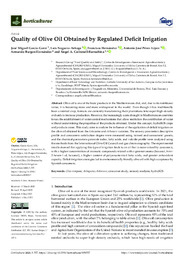Por favor, use este identificador para citar o enlazar este ítem:
https://hdl.handle.net/11000/32393Registro completo de metadatos
| Campo DC | Valor | Lengua/Idioma |
|---|---|---|
| dc.contributor.author | GARCÍA GARVÍ, JOSE MIGUEL | - |
| dc.contributor.author | Noguera-Artiaga, Luis | - |
| dc.contributor.author | Hernández, Francisca | - |
| dc.contributor.author | Perez Lopez, Antonio Jose | - |
| dc.contributor.author | Burgos-Hernandez, Armando | - |
| dc.contributor.author | Carbonell-Barrachina, Ángel A. | - |
| dc.contributor.other | Departamentos de la UMH::Producción Vegetal y Microbiología | es_ES |
| dc.date.accessioned | 2024-07-01T10:33:11Z | - |
| dc.date.available | 2024-07-01T10:33:11Z | - |
| dc.date.created | 2023-05-06 | - |
| dc.identifier.citation | Horticulturae 2023, 9(5), 557 | es_ES |
| dc.identifier.issn | 2311-7524 | - |
| dc.identifier.uri | https://hdl.handle.net/11000/32393 | - |
| dc.description.abstract | Olive oil is one of the basic products in the Mediterranean diet, and, due to its nutritional value, it is becoming more and more widespread in the world. Even though it has traditionally been a rainfed crop, farmers are currently transforming their plantations into super-high-density orchards to increase production. However, the increasingly acute drought in Mediterranean countries forces the establishment of water control mechanisms that allow restriction the contribution of water without undermining the properties of the products obtained. Under this concept, hydroSOS crops and products arose. This study aims to analyze the influence of the application of deficit irrigation on the olive oil obtained from the Arbequina and Arbosana varieties. The sensory parameters descriptive profile and consumers satisfaction degree were measured using trained and consumers’ panels, and the chemical parameters peroxide index, fatty acids, and volatile profile were analyzed using the methods from the International Olive Oil Council and gas chromatography. The experimental results showed that applying this type of irrigation leads to an oil that is more valued by consumers, with a higher concentration of aromatic compounds related with a greener aroma (hexanol, trans-2-hexen-1-ol, hexanal), a higher content of polyunsaturated fatty acids, and greater antioxidant capacity. Deficit irrigation strategies led to environmentally friendly olive oil with high acceptance by Spanish consumers | es_ES |
| dc.format | application/pdf | es_ES |
| dc.format.extent | 12 | es_ES |
| dc.language.iso | eng | es_ES |
| dc.publisher | MDPI | es_ES |
| dc.rights | info:eu-repo/semantics/openAccess | es_ES |
| dc.rights.uri | http://creativecommons.org/licenses/by-nc-nd/4.0/ | * |
| dc.subject | Olea europaea | es_ES |
| dc.subject | Arbequina | es_ES |
| dc.subject | Arbosana | es_ES |
| dc.subject | Consumer study | es_ES |
| dc.subject | Sensory analysis | es_ES |
| dc.subject | HydroSOS | es_ES |
| dc.subject.other | CDU::6 - Ciencias aplicadas::63 - Agricultura. Silvicultura. Zootecnia. Caza. Pesca | es_ES |
| dc.title | Quality of Olive Oil Obtained by Regulated Deficit Irrigation | es_ES |
| dc.type | info:eu-repo/semantics/article | es_ES |
| dc.relation.publisherversion | https://doi.org/10.3390/horticulturae9050557 | es_ES |

Ver/Abrir:
Quality of Olive Oil Obtained by Regulated Deficit Irrigation.pdf
472,71 kB
Adobe PDF
Compartir:
 La licencia se describe como: Atribución-NonComercial-NoDerivada 4.0 Internacional.
La licencia se describe como: Atribución-NonComercial-NoDerivada 4.0 Internacional.
.png)